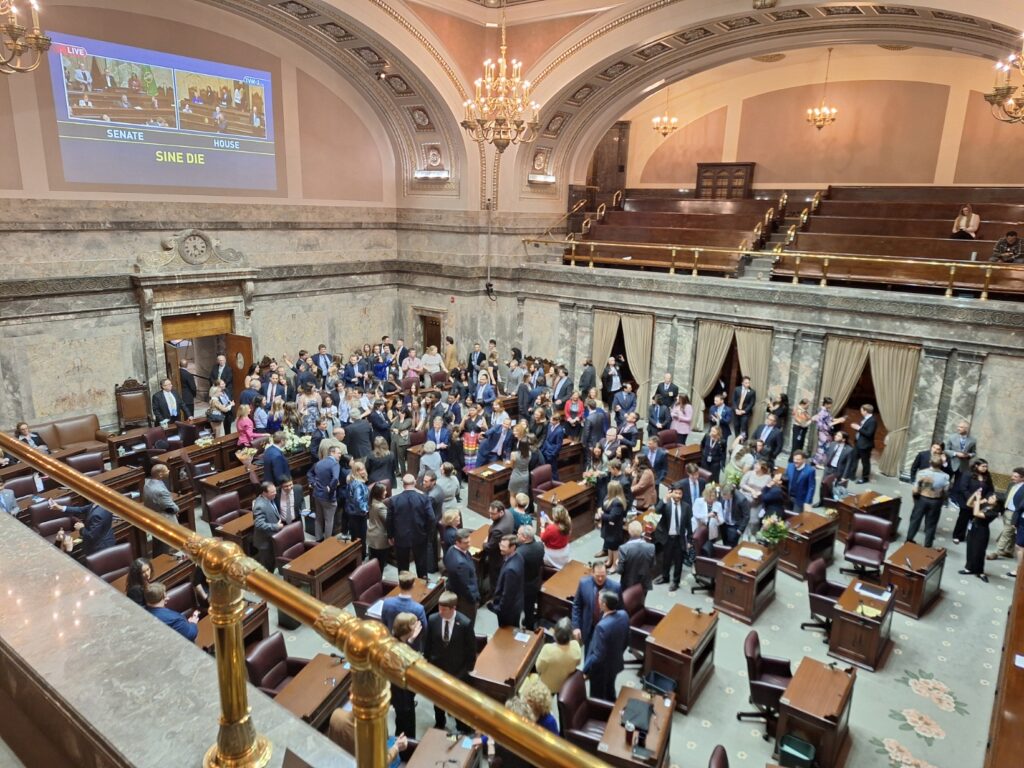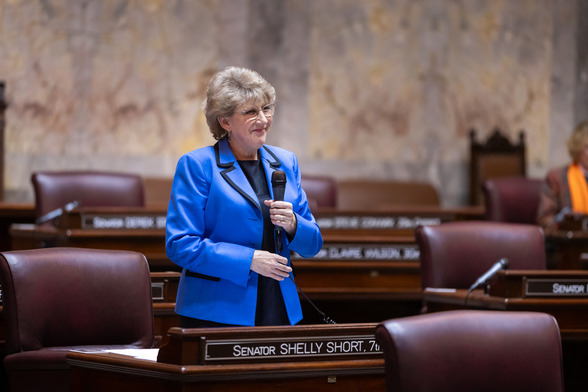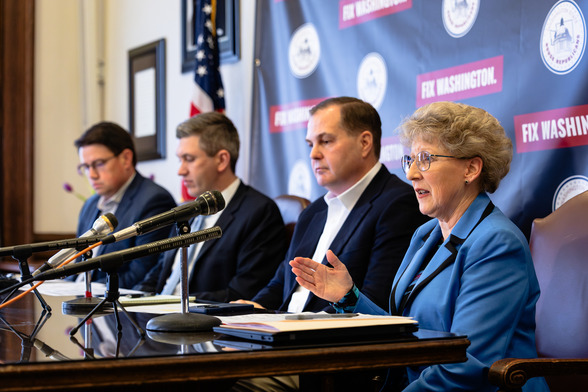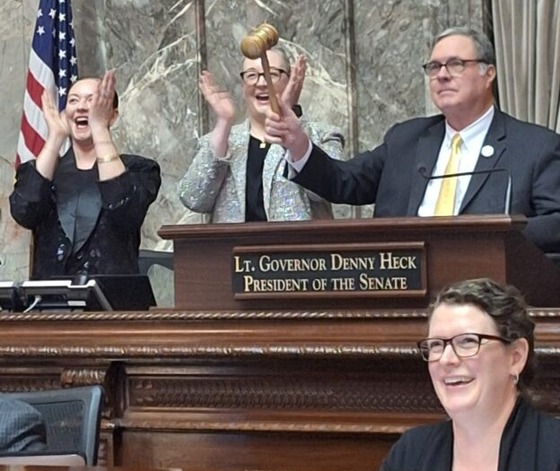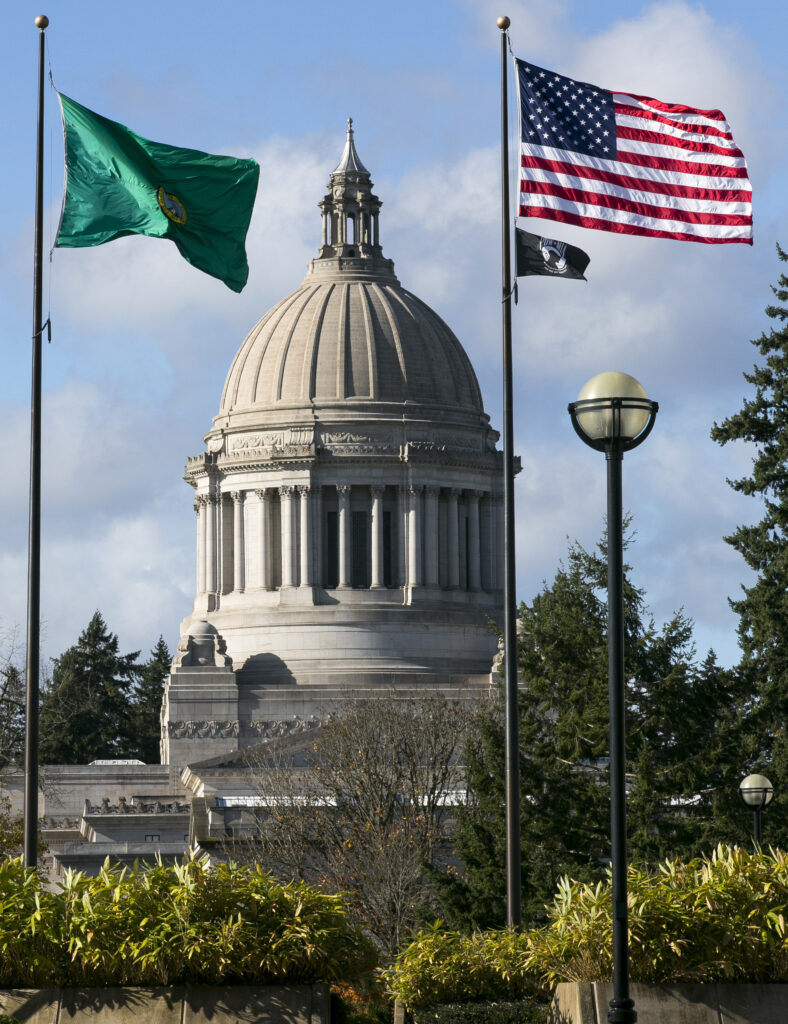Note: This e-newsletter was distributed to Sen. Shelly Short’s subscribers on April 10, 2025. To subscribe to Sen. Shelly Short’s e-newsletters, click here.
Staff and well-wishers crowded the Senate floor April 27 as we adjourned our 2025 legislative session.
Dear Friends and Neighbors,
In 2025, the Washington Legislature made history, and not in a good way. Under the leadership of a Seattle-centric Democratic majority, this year’s Legislature passed the largest tax increase the state has ever seen. It created a budget crisis and then failed to deal with it responsibly. It passed a spate of bills designed to increase the power and intrusiveness of state government. And at a time when the rest of the country was walking back the woke excesses of the last several years, the Washington Legislature doubled down.
There were a few bright spots along the way as we managed to defeat some of the worst proposals our colleagues had to offer. Here and there we managed to pass legislation that will make a difference to the people of Northeastern and North-Central Washington. But let’s not kid ourselves. This session was so damaging to our economy and will inflict so much hardship on individuals that it will take Washington years to recover, if we ever do.
At this point we are still waiting for the final denouement. Our new governor, Bob Ferguson, has until May 20 to decide whether he will sign the budget, make partial vetoes or reject the whole thing and call us back for a special session and a do-over. A special session may be the people’s only hope for a better outcome, but it would require the governor to put the interests of the state ahead of his political party, something we don’t often see in Olympia. In this e-newsletter, I’ll tell you what happened this year. The worst part? It didn’t have to be this way.
As floor leader for the Senate Republican Caucus, I play an important parliamentary role whenever my team is on the Senate floor. I help coordinate Senate debate, make motions for the caucus, act as spokesperson for Senate Republicans on matters of Senate process, and help keep the business of the Senate flowing smoothly.
A SESSION THAT REWROTE THE RULES – In this eighth year of one-party control of the Legislature, we got our best look yet at the dark side of “progressive” politics. State expenditures doubled over the last decade as our friends broke every rule of sound budgeting and repeated every mistake that had gotten the state in trouble in the past. To no one’s surprise, we found ourselves in trouble again. Yet there was something remarkable about this year’s budget crisis. This was the first time the Legislature created one all by itself, by spending wildly and unsustainably, with no help from a recession or any other external cause.
Yet it didn’t need to be a disaster. We had more than enough money to meet all of the state’s foundational needs without harmful cuts. The problem was really that we were about $7 billion short of paying for the new spending our colleagues had authorized in previous sessions — and they wanted to spend even more.
Normally we would have a simple way to address problems like these. The Legislature would admit its mistake, change its plans, cut spending, and bring expenses in line with revenues. Not this Legislature. To keep spending skyrocketing, our colleagues enacted a whopping tax increase totaling $12.5 billion at the state and local levels.
BIGGEST TAX INCREASE EVER — Ultimately our colleagues passed a $78 billion operating budget, an 8.2 percent increase over the last one. It is the fourth consecutive budget that spends more than the state expects to collect. This budget is supported by a hodge-podge of taxes and fees that include:
- Business and occupations tax increases,singling out some disfavored industries for especially punitive rates (HB 2081),
- Sales tax expansion,extending the sales tax to products and businesses that had been exempt, including temp agencies, digital advertising and tobacco cessation products (SB 5814),
- Higher rates for capital gains and estate taxes (SB 5813),
- Elimination of certain tax incentives (SB 5794),
- A new tax on the sale of electric-vehicle credits (HB 2077),written in such a way that it applies only to Tesla. Take that, Elon Musk!
Contrary to our colleagues’ assertions that they are targeting the rich, nearly all of this comes back to you, one way or another, directly and indirectly – from nickel-and-diming you with hunting and fishing license increases to enormous business taxes that inevitably will be passed on to consumers. Because there were no meaningful course corrections this year, we can expect even bigger problems next time we hit a bump.
A BETTER WAY – Now for the kicker. We didn’t need to do any of this. We used the same numbers our colleagues were using and wrote a budget bill of our own. We showed it was possible to balance the budget with no new taxes AND avoid damaging cuts. All we needed to do was avoid new spending for non-emergency purposes and enact a few sensible, non-controversial efficiencies, like better accounting for Medicaid spending. What our ‘$ave Washington” budget really demonstrated was that this year’s enormous new taxes were completely avoidable. They were driven entirely by new spending, and the real problem was our colleagues’ lack of self-restraint. The good news is that if the governor vetoes the budget our colleagues passed and tells them to try again, we’ve got a much better budget bill that could take its place. We would be delighted for the Legislature to pass it, and I am sure the people of Washington would feel the same.
Joining Republican leaders in the House and Senate for a March media availability.
TAXES ON TRANSPORTATION – And the taxes kept coming all session long. Transportation is considered separately from the operating budget, and this year’s Legislature enacted a six-cent-a-gallon gas-tax increase that takes effect in July, along with a six-cent-a-gallon increase for diesel that will be phased in over the next two years. This tax hike has a new feature, automatic 2-percent annual increases that will keep this tax rising forever. Registration and weight fees also were increased. In another bill, our colleagues also voted to ratchet up the requirements of Washington’s unworkable low-carbon fuel standards law. Taken together, these two measures will add about 50 cents a gallon to Washington’s already-high gas prices by 2028. Tax increases of this type are especially hard on rural regions like ours, because we must travel longer distances than in urban areas.
SETUP FOR McCLEARY 2.0 – Democrats started the session with a plan that would have allowed property taxes to increase at three times their current rate without a public vote. Public uproar nixed that idea. But what our colleagues wound up passing was just as bad, a property tax scheme that undoes the hard-fought compromises of a decade ago on school financing, opening the door to another school-financing lawsuit.
SB 2049 allows school districts to raise substantially more money through local property tax levies, a plan that inevitably will create larger disparities between wealthy urban districts and their rural counterparts. This is precisely what the state Supreme Court said not to do in its 2012 ruling on McCleary v. Washington. Why bring this upon us again? An adverse ruling would create new pressure for additional taxes, perhaps the general income tax our colleagues have been attempting to enact for decades.
EXTREME POLICY LEGISLATION – This year our colleagues continued their efforts to force liberal Seattle attitudes on the entire state. These are just a few examples of the ideologically-driven bills passed this year – sadly, too many to list here.
- Gutting the people’s initiative on parental rights in the public schools, and increasing Olympia’s ability to dictate to local school districts on curriculum and transgender participation in girls’ sports (HB 1296),
- Unemployment benefits for striking workers,giving unions the upper hand in labor negotiations and an incentive to manufacturers to locate anywhere but Washington (SB 5041),
- More power for health officials in the next pandemic,with a bill written so broadly and vaguely that it should make all of us nervous (HB 1531),
- Infringing on Second Amendment rights with a “permit to purchase” bill requiring completion of a gun-safety course before a firearm can be purchased, thus placing a condition on the exercise of a right guaranteed by the state and federal constitutions (HB 1163),
- Expanding the state’s taxpayer-funded “reparations” program, which provides low-interest loans for home purchases to people of some races and ethnic backgrounds while excluding others, a probable violation of the 14thAmendment to the U.S. Constitution, should anyone choose to sue (HB 1696),
- Doubling down on Washington’s shortage of affordable housing by imposing rent control, which will eliminate any incentive to build new rental units, and give landlords an incentive to sell rental properties (HB 1217),
And many, many more.
Final gavel falls to end the 2025 session.
A HANDFUL OF VICTORIES – Along the way, we helped marshal public opposition to kill some of the worst bills of the session, like a proposal for costly woodstove regulation that would have duplicated federal efforts. Another measure would have imposed onerous requirements on initiative campaigns, squelching the public’s ability to challenge the Legislature. We also worked on legislation that will do quite a bit of good for the 7th District.
A bill from my House seatmate Andrew Engell reduces costs for small Group B water systems. My other seatmate, Hunter Abell, introduced a significant bill to fund more police officers statewide, and while it did not pass, the final budget contained some funding toward that end. I passed three measures:
SB 5343 continues funding for a wildlife specialist in Ferry, Pend Oreille and Stevens counties to aid the Department of Fish and Wildlife in wolf management. Grants are provided through the Northeast Washington Wolf-Livestock Management Account, which pays for non-lethal countermeasures to wolf predation. The wildlife specialist monitors conditions on the range and provides a point of contact for area residents affected by predation. Funding will be maintained through 2031.
SB 5165 addresses an indirect result of growing predator populations in the backwoods. As deer and elk are driven into the lowlands, crop damage is on the rise. The state currently compensates farmers for crop losses in excess of $1,000 due to deer and elk. The bill requires that at least 20 percent of state compensation funding is earmarked for sparsely populated counties with 21 people or fewer per square mile. Twelve of the state’s 39 counties would qualify.
SB 5334, introduced at the request of the Department of Natural Resources, creates an appeals process for citations issued by the agency for violations of burn permits. The bill gives the public an avenue to challenge enforcement actions by sending appeals to the state Pollution Control Hearings Board, an independent forum.
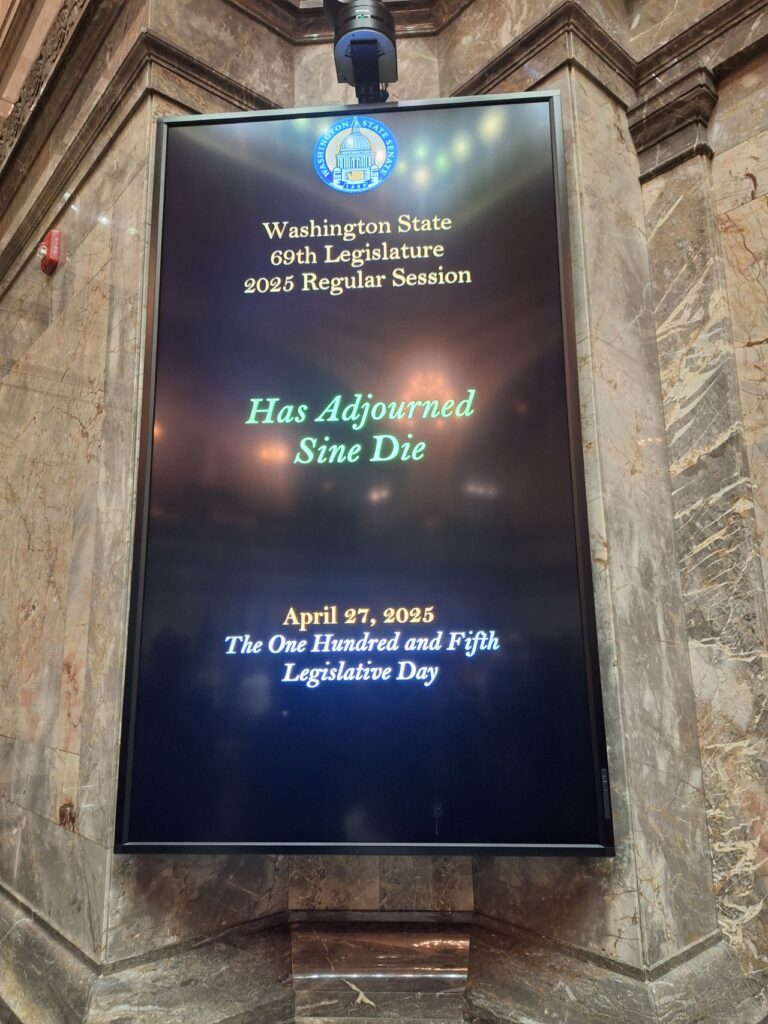 A TOUGH SESSION – This was a session of unjustifiable taxes and missed opportunities. Our juvenile rehabilitation system is in urgent need of reform; our laws need an update if we are to deal with the scourge of fentanyl, and why did we fail so utterly to address affordable housing? By failing to address unsustainable spending, this year’s Legislature has made our eventual reckoning all the harder.
A TOUGH SESSION – This was a session of unjustifiable taxes and missed opportunities. Our juvenile rehabilitation system is in urgent need of reform; our laws need an update if we are to deal with the scourge of fentanyl, and why did we fail so utterly to address affordable housing? By failing to address unsustainable spending, this year’s Legislature has made our eventual reckoning all the harder.
If the governor calls us back, we Republicans will be there to help. The result this session, unfortunately, shows that if we are going to make progress, what we need first is better balance in Olympia.
Our session has adjourned, but I represent you year-round. If you have a comment about the direction of state government, or you have a problem dealing with a state agency, let me know how I can help. You can reach me with the contact information below. My most important duty is to serve you. Thanks for reading!

Sen. Shelly Short, 7th Legislative District
Contact me!
Telephone: (360) 786-7612
Email: Shelly.Short@leg.wa.gov
Mailing address: P.O. Box 40407/ Olympia, WA/ 98504
Website address: https://shellyshort.src.wastateleg.org/
Legislative Hotline: 1 (800) 562-6000











